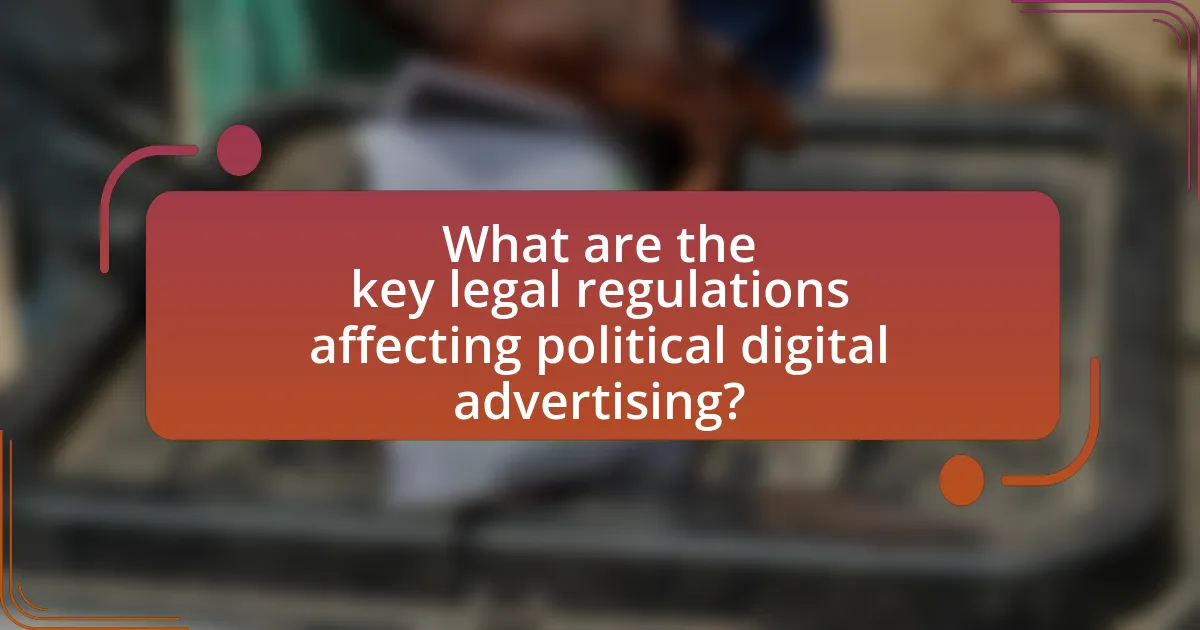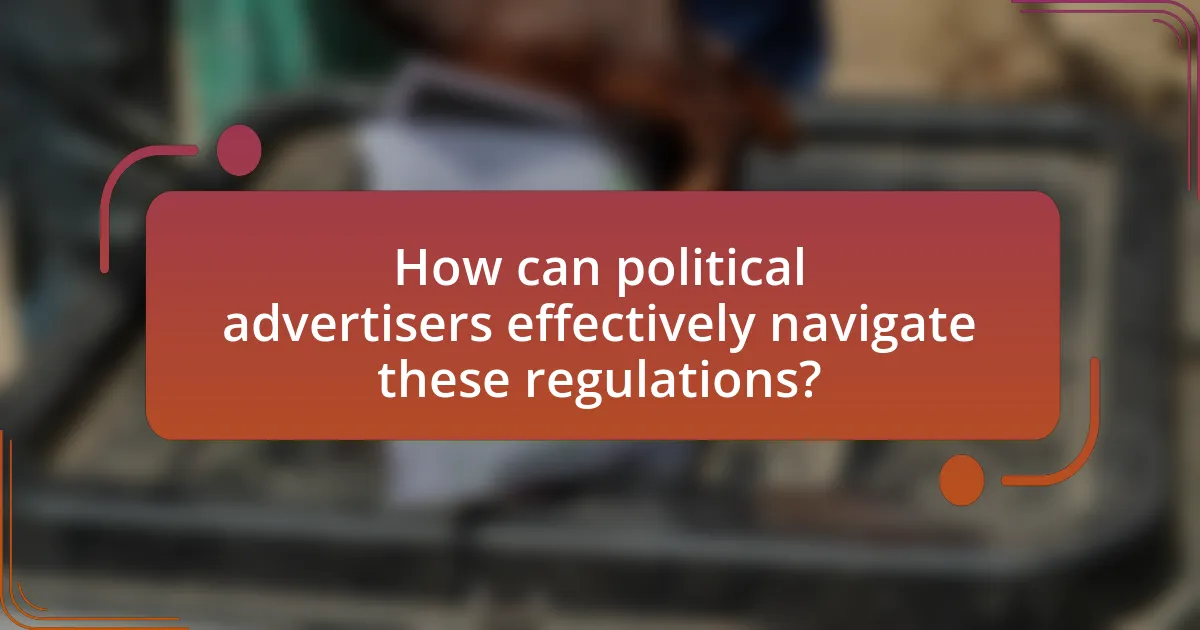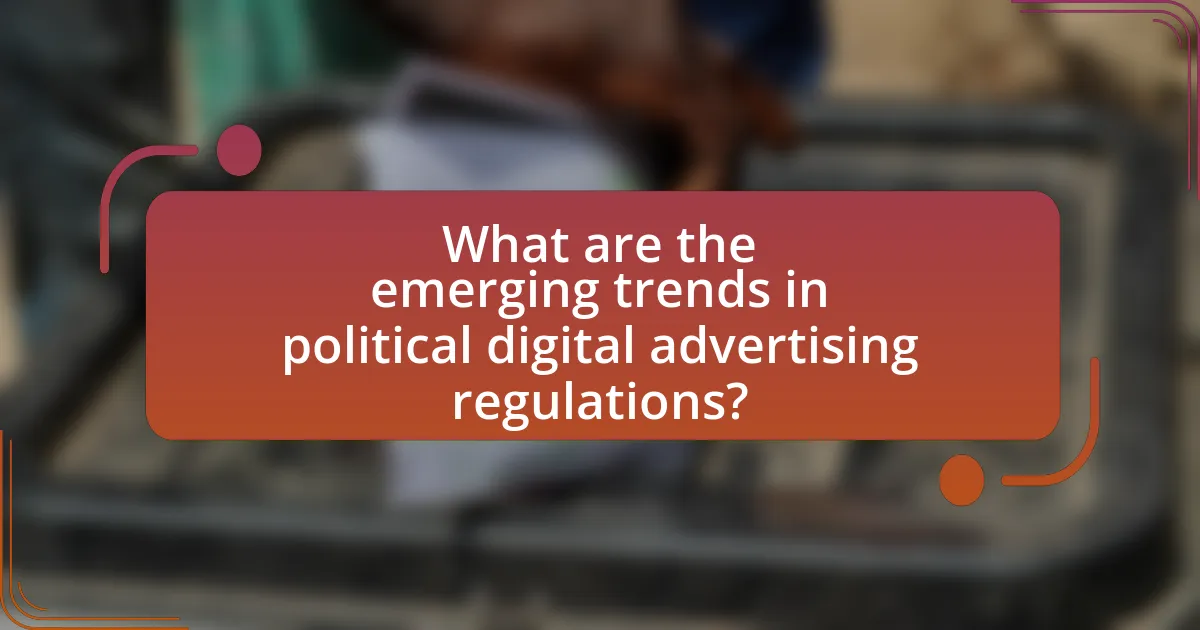The article focuses on the legal regulations governing political digital advertising, highlighting key frameworks such as the Federal Election Commission (FEC) rules, the Communications Decency Act, and the Honest Ads Act. It examines the impact of federal laws on transparency and funding disclosures, as well as the varying state regulations that shape advertising practices. Additionally, the role of social media platforms in enforcing compliance and the consequences of non-compliance for political advertisers are discussed. The article also addresses emerging trends in regulation, the influence of technology on advertising practices, and practical strategies for advertisers to navigate the complex legal landscape effectively.

What are the key legal regulations affecting political digital advertising?
Key legal regulations affecting political digital advertising include the Federal Election Commission (FEC) rules, which mandate transparency in campaign financing and require disclosures of funding sources for political ads. Additionally, the Communications Decency Act (CDA) Section 230 provides some immunity to platforms hosting political ads, while the Honest Ads Act aims to increase transparency by requiring digital platforms to maintain a public database of political ads and their sponsors. These regulations are designed to ensure accountability and transparency in political advertising, reflecting the need for ethical standards in the digital landscape.
How do federal laws impact political digital advertising?
Federal laws significantly impact political digital advertising by establishing regulations that govern transparency, disclosure, and funding sources. The Federal Election Commission (FEC) mandates that political advertisements disclose their sponsors, ensuring that voters are aware of who is funding the messages they receive. Additionally, laws such as the Bipartisan Campaign Reform Act (BCRA) restrict the use of corporate and union funds for political advertising, thereby influencing the financial dynamics of campaign strategies. These regulations aim to prevent misinformation and promote accountability in political messaging, as evidenced by the FEC’s enforcement actions against violations, which underscore the importance of compliance in the digital advertising landscape.
What specific federal regulations must advertisers comply with?
Advertisers must comply with several specific federal regulations, including the Federal Trade Commission (FTC) Act, the Communications Act, and the Federal Election Commission (FEC) regulations. The FTC Act prohibits deceptive or misleading advertising practices, ensuring that all claims made in advertisements are truthful and substantiated. The Communications Act mandates that political advertisements disclose their funding sources and sponsors, promoting transparency in political messaging. Additionally, FEC regulations govern the financing of political advertisements, requiring disclosure of contributions and expenditures related to campaign advertising. These regulations collectively aim to protect consumers and ensure fair practices in advertising, particularly in the political arena.
How do these regulations vary by state?
Regulations for political digital advertising vary significantly by state, with each state implementing its own rules regarding disclosure, funding sources, and content restrictions. For instance, California requires detailed disclosures about the funding of political ads, while Texas has less stringent requirements, focusing primarily on transparency in campaign finance. Additionally, some states, like New York, have specific regulations concerning the timing and placement of political ads, whereas others may not impose such restrictions. These differences are influenced by state laws, political climates, and the level of enforcement by state election boards, leading to a complex landscape for political digital advertising across the United States.
What role do social media platforms play in regulating political ads?
Social media platforms play a crucial role in regulating political ads by implementing policies that govern the content and targeting of such advertisements. These platforms, including Facebook, Twitter, and Google, have established guidelines to ensure transparency, such as requiring advertisers to disclose funding sources and providing users with access to ad archives. For instance, Facebook’s Ad Library allows users to view all active political ads and their funding details, which enhances accountability. Additionally, these platforms often collaborate with fact-checking organizations to identify and mitigate misinformation in political advertising, thereby promoting a more informed electorate.
What policies do major platforms like Facebook and Twitter have in place?
Major platforms like Facebook and Twitter have specific policies aimed at regulating political advertising and ensuring transparency. Facebook requires advertisers to complete an authorization process and include disclaimers on political ads, while also maintaining a publicly accessible Ad Library that documents all political ads run on the platform. Twitter, on the other hand, has banned political advertising entirely since 2019, stating that the decision was made to prioritize public conversation over commercial interests. These policies are designed to comply with legal regulations and enhance accountability in political digital advertising.
How do these policies affect ad targeting and content?
Policies regulating political digital advertising significantly restrict ad targeting and content by imposing guidelines on data usage and transparency. These regulations often require advertisers to disclose the sources of their data and limit the use of sensitive personal information, which directly impacts how precisely they can target specific demographics. For instance, the European Union’s General Data Protection Regulation (GDPR) mandates explicit consent for data collection, thereby reducing the granularity of targeting options available to advertisers. Additionally, policies may enforce content restrictions, such as prohibiting misleading information or requiring fact-checking, which shapes the messaging and creative strategies employed in political ads. These measures aim to enhance accountability and protect consumer rights, ultimately leading to a more regulated and less personalized advertising landscape.
What are the consequences of non-compliance with advertising regulations?
Non-compliance with advertising regulations can result in significant legal and financial consequences for businesses and individuals. Regulatory bodies, such as the Federal Trade Commission (FTC) in the United States, can impose fines that range from thousands to millions of dollars depending on the severity of the violation. For instance, in 2020, the FTC levied a $5 billion fine against Facebook for privacy violations, illustrating the potential financial repercussions of non-compliance. Additionally, non-compliance can lead to legal actions, including lawsuits from consumers or competitors, which can further escalate costs and damage reputations. Furthermore, businesses may face restrictions on their advertising capabilities, including the suspension of advertising accounts or platforms, limiting their ability to reach audiences effectively.
What penalties can political advertisers face for violations?
Political advertisers can face penalties such as fines, legal action, and restrictions on future advertising for violations of election laws and regulations. For instance, the Federal Election Commission (FEC) can impose civil penalties that may reach up to $10,000 per violation, depending on the severity and nature of the infraction. Additionally, advertisers may be subject to state-level penalties, which can vary significantly, including criminal charges in cases of willful misconduct. These penalties are enforced to ensure compliance with regulations that govern transparency and honesty in political advertising, thereby maintaining the integrity of the electoral process.
How can non-compliance impact a political campaign’s reputation?
Non-compliance can severely damage a political campaign’s reputation by eroding public trust and credibility. When a campaign fails to adhere to legal regulations, it may face negative media coverage, which can lead to public perception of dishonesty or unethical behavior. For instance, the 2016 U.S. presidential campaign saw significant backlash against candidates who were accused of violating campaign finance laws, resulting in diminished voter support and increased scrutiny from regulatory bodies. Such incidents highlight how non-compliance not only attracts legal penalties but also creates a lasting negative impression among constituents, ultimately impacting electoral success.

How can political advertisers effectively navigate these regulations?
Political advertisers can effectively navigate regulations by thoroughly understanding the legal frameworks governing digital advertising, including campaign finance laws and data privacy regulations. This involves staying updated on federal and state laws, such as the Federal Election Commission guidelines, which mandate transparency in ad funding and disclosures. Additionally, utilizing compliance tools and consulting legal experts can help ensure adherence to these regulations. For instance, the 2020 election cycle saw increased scrutiny on social media platforms, prompting advertisers to implement stricter verification processes for ad placements, thereby reducing the risk of non-compliance.
What strategies can be employed to ensure compliance?
To ensure compliance in political digital advertising, organizations should implement a comprehensive compliance program that includes regular training, monitoring, and audits. Regular training ensures that all team members understand the legal requirements and ethical standards related to political advertising, which is crucial given the complex and evolving nature of regulations. Monitoring involves continuously reviewing advertising content and practices to identify potential compliance issues before they escalate. Conducting audits helps organizations assess their adherence to regulations and identify areas for improvement. According to a study by the Pew Research Center, 70% of political advertisers reported that compliance with regulations is a significant challenge, highlighting the importance of these strategies in navigating the legal landscape effectively.
How can advertisers stay updated on changing regulations?
Advertisers can stay updated on changing regulations by regularly monitoring official government websites and industry associations that publish updates on legal requirements. For instance, the Federal Election Commission (FEC) provides real-time information on campaign finance laws and advertising regulations, which is crucial for compliance. Additionally, subscribing to newsletters from legal firms specializing in advertising law can provide timely insights into new regulations and interpretations. Engaging in professional networks and attending industry conferences also facilitates knowledge sharing about regulatory changes, ensuring advertisers remain informed and compliant.
What resources are available for legal guidance in political advertising?
Legal guidance in political advertising can be obtained from several key resources. The Federal Election Commission (FEC) provides comprehensive regulations and guidelines on campaign finance laws, including political advertising. Additionally, the American Bar Association (ABA) offers resources and publications that address legal issues related to political campaigns and advertising. State election offices also provide specific regulations and guidance pertinent to local political advertising laws. Furthermore, legal firms specializing in election law can offer tailored advice and services to navigate complex legal landscapes in political advertising.
What best practices should be followed in political digital advertising?
Best practices in political digital advertising include ensuring compliance with legal regulations, targeting the right audience, and maintaining transparency. Compliance with laws such as the Federal Election Commission regulations in the United States is crucial, as violations can lead to significant penalties. Targeting the right audience enhances the effectiveness of campaigns; for instance, using data analytics to identify voter demographics can increase engagement rates. Transparency is essential for building trust; disclosing funding sources and ad sponsors aligns with ethical standards and legal requirements. These practices are supported by research indicating that campaigns adhering to legal and ethical guidelines achieve higher voter trust and engagement.
How can transparency be maintained in political ad campaigns?
Transparency in political ad campaigns can be maintained through clear disclosure of funding sources and the use of standardized labeling for advertisements. By requiring campaigns to publicly disclose who finances their ads, voters can better understand potential biases and influences. For instance, the Federal Election Commission mandates that political ads include disclaimers identifying the sponsor, which enhances accountability. Additionally, implementing digital platforms that provide users with access to ad archives, such as Facebook’s Ad Library, allows for greater scrutiny and informed decision-making by the electorate. These measures collectively foster an environment of trust and integrity in political advertising.
What ethical considerations should advertisers keep in mind?
Advertisers should prioritize honesty, transparency, and respect for consumer privacy. Honesty involves presenting products and services accurately without misleading claims, as false advertising can lead to legal repercussions and damage to brand reputation. Transparency requires clear communication about the nature of advertisements, especially in political contexts, where the source and funding of messages must be disclosed to maintain public trust. Respect for consumer privacy entails safeguarding personal data and ensuring that targeted advertising practices comply with regulations like the General Data Protection Regulation (GDPR), which mandates explicit consent for data usage. These ethical considerations are essential for maintaining integrity and fostering a responsible advertising environment.

What are the emerging trends in political digital advertising regulations?
Emerging trends in political digital advertising regulations include increased transparency requirements, stricter data privacy laws, and enhanced scrutiny of misinformation. Regulatory bodies are mandating that political advertisers disclose funding sources and the targeting criteria used for ads, as seen in the European Union’s Digital Services Act. Additionally, jurisdictions like California have implemented laws that require explicit consent for data collection, reflecting a global shift towards protecting user privacy. Furthermore, initiatives to combat misinformation, such as fact-checking partnerships and labeling of political ads, are becoming more prevalent, as evidenced by platforms like Facebook and Twitter enhancing their ad review processes. These trends indicate a growing emphasis on accountability and ethical standards in political digital advertising.
How is technology influencing the regulation of political ads?
Technology is significantly influencing the regulation of political ads by enabling more precise targeting and transparency in advertising practices. Digital platforms utilize algorithms and data analytics to target specific demographics, which has prompted regulators to implement stricter guidelines to ensure accountability and prevent misinformation. For instance, the Federal Election Commission (FEC) in the United States has updated its rules to require disclosure of funding sources for online political ads, reflecting the need for transparency in the digital age. Additionally, social media companies like Facebook and Twitter have introduced their own policies to combat false information and enhance ad transparency, such as providing access to ad libraries that track political ad spending and targeting. These developments illustrate how technology not only shapes advertising strategies but also necessitates evolving regulatory frameworks to address new challenges in political communication.
What new tools are being developed for compliance monitoring?
New tools being developed for compliance monitoring in political digital advertising include AI-driven analytics platforms, automated reporting systems, and blockchain-based verification tools. These innovations enhance the ability to track and ensure adherence to legal regulations by providing real-time data analysis, streamlining compliance reporting, and ensuring transparency in ad spending and targeting practices. For instance, AI-driven platforms can analyze vast amounts of data to identify potential compliance risks, while blockchain technology offers immutable records of transactions, which can be crucial for audits and regulatory reviews.
How are data privacy concerns shaping advertising regulations?
Data privacy concerns are significantly shaping advertising regulations by prompting governments to implement stricter laws governing the collection and use of personal data. For instance, the General Data Protection Regulation (GDPR) enacted by the European Union in 2018 established comprehensive guidelines for data protection and privacy, directly impacting how advertisers can target consumers. This regulation requires explicit consent from individuals before their data can be collected, thereby limiting the scope of targeted advertising and increasing transparency in data usage. Additionally, similar regulations, such as the California Consumer Privacy Act (CCPA), have emerged in the United States, reflecting a growing trend towards prioritizing consumer privacy in advertising practices. These regulatory changes are a direct response to public demand for greater control over personal information, influencing how advertisers strategize their campaigns and engage with audiences.
What future changes can be anticipated in political advertising laws?
Future changes in political advertising laws are likely to focus on increased transparency and regulation of digital platforms. As concerns about misinformation and foreign interference grow, lawmakers may implement stricter disclosure requirements for political ads, mandating that platforms clearly label sponsored content and disclose funding sources. For instance, the Federal Election Commission has already begun discussions on updating regulations to address the complexities of online advertising, reflecting a trend towards more stringent oversight. Additionally, states like California have enacted laws requiring greater transparency in online political advertising, setting a precedent that may influence national standards.
How might upcoming legislation affect digital advertising strategies?
Upcoming legislation may significantly alter digital advertising strategies by imposing stricter regulations on data privacy and targeting practices. For instance, laws like the General Data Protection Regulation (GDPR) in Europe have already led advertisers to adopt more transparent data collection methods and prioritize user consent. As new legislation emerges, similar requirements could compel digital advertisers to rethink their targeting algorithms, potentially reducing the effectiveness of personalized ads. Additionally, regulations may limit the types of data that can be used for advertising, which could lead to a shift towards broader audience targeting rather than hyper-specific campaigns. This evolution in legal frameworks necessitates that advertisers remain agile and adapt their strategies to comply with new rules while still achieving their marketing objectives.
What role will public opinion play in shaping future regulations?
Public opinion will significantly influence future regulations by shaping policymakers’ perceptions and priorities. As citizens express their views on issues such as data privacy, misinformation, and transparency in political advertising, lawmakers are likely to respond by enacting regulations that reflect these concerns. For instance, surveys indicate that a majority of voters prioritize stricter regulations on online political ads, which can lead to legislative action aimed at increasing accountability and reducing misinformation. This responsiveness to public sentiment is evident in recent regulatory changes in various jurisdictions, where public advocacy has prompted more stringent rules governing digital political advertising.
What practical tips can help political advertisers succeed in a regulated environment?
Political advertisers can succeed in a regulated environment by ensuring compliance with all relevant laws and regulations. This includes staying updated on federal, state, and local campaign finance laws, which dictate how funds can be raised and spent. For instance, the Federal Election Commission (FEC) requires transparency in political advertising, mandating disclosures about funding sources. Additionally, utilizing data analytics to target audiences effectively while adhering to privacy regulations, such as the General Data Protection Regulation (GDPR), can enhance campaign effectiveness. Engaging legal counsel to review advertising content and strategies can further mitigate risks associated with non-compliance.




